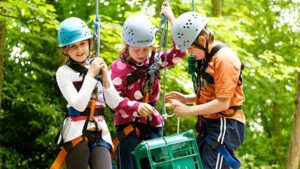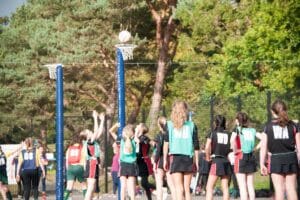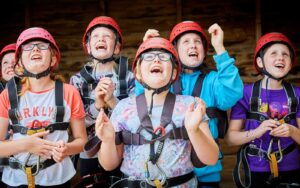Forming positive relationships is a cornerstone of childhood development and education. When students build strong connections with their peers, teachers and wider community, they create a foundation of trust, respect and belonging. These relationships don’t just help them feel happier day to day, they also shape the skills and attitudes they carry into adulthood. From working effectively in teams to growing their self-esteem, healthy relationships play a vital role in helping young people thrive, both in and out of the classroom.
Positive relationships can also influence academic success, resilience, and emotional wellbeing. When children feel safe and valued, they’re better equipped to manage stress, engage in learning and take on new challenges with confidence. In many ways, relationships are the hidden thread that holds a positive school experience together.
What is relationship building?
Relationship building is the process of creating meaningful, supportive connections with others. For students, this could be as simple as making a new friend on the playground, learning to share and take turns, or collaborating with classmates on a project. As they grow older, it also includes more complex skills, like understanding other people’s perspectives, offering encouragement and resolving disagreements fairly.
Research highlights just how crucial this process is. In fact, studies have shown that students who feel connected to their peers and adults at school are more than twice as likely to report high levels of engagement and motivation compared to those who feel isolated. These daily interactions shape not only how students feel about school, but also how they see themselves and others.
Over time, building relationships helps children and young people:
- Develop trust in others, laying the groundwork for secure friendships and supportive mentoring relationships.
- Communicate their thoughts and feelings more confidently, which helps them express needs, solve problems and collaborate effectively.
- Show empathy and understanding, learning to appreciate experiences different from their own.
- Navigate disagreements in a respectful way, which supports healthier conflict resolution and reduces the likelihood of bullying.
Environments that encourage collaboration, whether in school, during after-school clubs or through shared experiences beyond the classroom, can help students form these bonds more naturally.
The importance of building relationships for students
Healthy relationships play a pivotal role in every aspect of a student’s life. They support emotional wellbeing, academic growth and social development. Let’s look at some of the key reasons why building relationships matters so much, along with examples of how these benefits appear in day-to-day life.
- Facilitates teamwork
One of the most significant benefits of relationship building is how it strengthens teamwork. When students form strong bonds, they learn to work more effectively in groups, relying on trust and shared responsibility to achieve goals.
Consider a classroom project where pupils must design a presentation together. Those who feel comfortable and respected within their group are more likely to:
- Contribute ideas confidently
- Listen actively to their peers
- Divide tasks fairly
- Support each other through challenges
This cooperation teaches the value of collective effort and accountability. The same applies to sports teams, music ensembles or drama groups, where mutual trust and shared success go hand in hand.
Outside the classroom, team-building activities on residential trips can amplify these lessons. For example, tackling an obstacle course or planning a group expedition requires students to communicate, strategise and encourage each other, often leading to new friendships and a lasting sense of camaraderie.
- Encourages empathy
Relationship building encourages students to become more empathetic and understanding. When they take time to learn about others’ experiences and emotions, they broaden their perspectives and strengthen their ability to relate.
Empathy in action could look like:
- Comforting a classmate who is upset
- Standing up for a peer who feels excluded
- Listening patiently to someone’s worries or ideas
- Adjusting behaviour to be more inclusive
These moments help cultivate a culture of kindness and respect. In an increasingly diverse world, empathy is also an essential skill for bridging cultural, social and generational gaps.
Classroom discussions that explore different viewpoints, paired or group work that mixes students with varied backgrounds and opportunities to reflect on shared experiences-like collaborative challenges or community projects-are all effective ways to nurture empathy.
- Reduces feelings of loneliness
A sense of belonging is fundamental to emotional wellbeing. Many students experience periods of loneliness, especially during transitions such as starting a new school or moving into a different year group. Having positive relationships helps counter these feelings and creates a supportive safety net.
When students feel accepted by their peers, they’re more likely to:
- Enjoy coming to school each day
- Participate in lessons and activities
- Seek help when they’re struggling
- Build resilience in the face of setbacks
Simple things, like being greeted warmly in the morning or having someone to sit with at lunch, can make all the difference. Residential trips can be particularly helpful for reducing loneliness. Sharing cabins, overcoming challenges together and spending unstructured time in a different setting often spark new connections that continue back in the classroom.
- Builds confidence
Positive relationships can significantly boost a student’s self-confidence. When young people know they are valued and respected by others, they feel more comfortable expressing themselves and taking healthy risks.
Confidence gained through relationships might lead a student to:
- Volunteer to read aloud in class
- Join a club or sports team that they were nervous about
- Share ideas during group work
- Try a new skill, like climbing or kayaking
Supportive friendships and mentoring relationships reinforce a sense of self-worth, making students feel capable of overcoming challenges. For example, a student might be hesitant about trying an activity like abseiling down a 10-metre wall. With encouragement from peers and teachers, they build the courage to step outside their comfort zone and experience a powerful sense of achievement.
- Develops interpersonal skills
Interpersonal skills are the tools we use to communicate, collaborate and build connections. For students, these skills are essential both in school and in later life.
Building relationships helps children learn:
- Verbal communication – using clear language to share ideas, feelings and instructions
- Non-verbal communication – interpreting body language, tone of voice and facial expressions
- Active listening – showing genuine interest and understanding
- Conflict resolution – finding solutions that respect everyone’s needs
- Cooperation – balancing personal goals with group priorities
These skills develop over time and through practice. Group activities, paired learning and residential experiences all provide opportunities to hone them in a safe, supportive environment.
Ways students can build relationships on residential trips
Residential trips create a unique setting where students can connect in ways that aren’t always possible during the school day. Being away from familiar routines and immersed in new experiences helps break down social barriers, enabling young people to get to know each other-and themselves-in fresh ways.
 Collaborative challenges
Collaborative challenges
Activities like raft-building, high ropes courses, and problem-solving games rely on teamwork and trust. Each brings unique challenges and opportunities to grow:
- Raft-building teaches clear communication and planning under pressure. When a raft doesn’t float as intended, students learn resilience and how to adapt quickly. Roles are shared, some design, some build, some test, so everyone takes responsibility for the result.
- High ropes courses push students to face fears, especially heights. Overcoming this requires personal courage and strong group support. Those on the ground often help with safety checks, building trust and accountability.
- Problem-solving games can lead to disagreements or failed attempts. These setbacks help students practise patience, listen to different viewpoints, and adjust their approach together.
Through these experiences, students learn to:
- Encourage each other through setbacks-whether it’s fear, frustration, or failure.
- Divide roles and responsibilities, recognising everyone’s strengths.
- Celebrate shared successes, no matter how small.
These challenges often become lasting memories that show what teamwork can achieve.
 Shared achievements
Shared achievements
Accomplishing something as a group like reaching the top of a climbing wall or completing a long hike gives students a powerful sense of belonging and pride. These achievements help cement friendships and reinforce positive self-perception.
Sharing success helps students:
- Cement friendships by bonding over shared triumphs.
- Boost their confidence and positive self-image through real, tangible achievement.
- Appreciate how working together can overcome obstacles that feel impossible alone.
These moments often stay with students long after the trip, shaping how they view teamwork and their own capabilities.
 Time to connect informally
Time to connect informally
Residential trips also offer unstructured time to relax together, sharing meals, or simply chatting in the evenings. These relaxed moments often spark genuine friendships that continue back at school.
These moments allow students to:
- Wind down and recharge emotionally after busy days.
- Engage in casual conversations that build trust and allow them to open up naturally.
- Form genuine friendships based on shared interests and stories rather than structured tasks.
- Practice important social skills such as listening, empathy, and conversational flow in a comfortable setting.
These informal connections often lay the foundation for lasting friendships back at school.
 Reflection and support
Reflection and support
Guided reflection before, during or after a residential trip gives students the chance to appreciate each other’s strengths, offer encouragement and acknowledge contributions. This helps build respect and reinforces the idea that everyone has something valuable to offer.
This structured time encourages:
- Offering genuine encouragement and constructive feedback.
- Building mutual respect by understanding the diverse skills and personalities within the group.
- Reinforcing the idea that everyone has a valuable role to play, which helps build inclusion and confidence.
- Developing emotional intelligence through recognising and valuing others’ experiences and efforts.
Reflection helps transform shared experiences into meaningful lessons that support ongoing positive group dynamics.
Special programmes, like UNITE, focus on bringing groups together through a balance of active challenges and guided team-building activities that support a positive group dynamic.
Connect, grow and unite on residential adventures
Looking for an unforgettable way to help your students build stronger connections? A residential experience can be a powerful opportunity to develop trust, empathy and confidence in a supportive environment. From adventurous outdoor challenges to guided team-building workshops, every activity is designed to nurture positive relationships.
At PGL, all activities are fully led by experienced instructors, allowing teachers and group leaders to focus on supporting students rather than managing sessions. Whether you choose a multi-activity programme or a specialist option like UNITE, there’s something for every group and every age.
By taking learning beyond the classroom, you create space for your students to connect, grow and thrive together.

 Collaborative challenges
Collaborative challenges Shared achievements
Shared achievements Time to connect informally
Time to connect informally Reflection and support
Reflection and support
